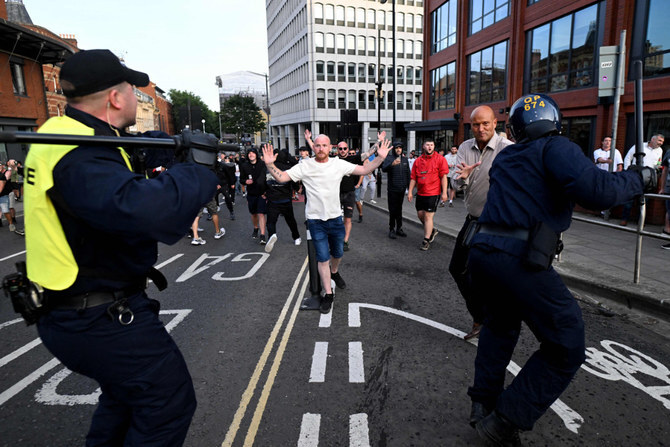LONDON: The UK is witnessing an escalation in Islamophobia that risks becoming “brutally divisive,” according to the chief executive of the Runnymede Trust think tank.
In an exclusive interview with The Guardian newspaper, Shabna Begum, — who took the helm of the race equality group earlier this year — said the underlying causes could potentially lead to more racist-driven riots and added political rhetoric had fueled the problem.
“The way politicians talk about Muslims now is so derogatory, it’s in the most brutally divisive terms,” she said, adding that British political discourse had evolved beyond Sayeeda Warsi’s “dinner table test,” a phrase coined by the Conservative peer in 2011 which claimed Islamophobia had become socially acceptable.
Referencing last summer’s riots, Begum warned that such violence could recur unless there was change.
“(The unrest) was the ugliest representation of the years of racism that have been manufactured through the political media conversation. And if we don’t do something differently, that ugliness will become just a regular feature of our politics,” she said.
The Runnymede Trust’s report on Islamophobia, backed by Warsi, Amnesty International UK, and the Muslim Council for Britain, documents the increasing hostility faced by British Muslims.
Due for publication on Nov. 18, it cites Tell Mama’s findings of a 335 percent spike in hate incidents in the four months up to February 2024, with women disproportionately affected.
Police figures show nearly 38 percent of religious hate crimes targeted Muslims and anti-religious hate crimes reached a record high last year, coinciding with the Israel-Hamas conflict.
Begum emphasized that the issue extended beyond physical attacks to “state-sponsored Islamophobia” embedded in policies and narratives. She added both the ruling Labour Party and the Conservatives were guilty of feeding a “bleak and dystopian” hostile climate for British Muslims.
She also highlighted the double standard faced by Muslims in public life, saying: “Whether it’s through being governors at schools, as we see through the Trojan horse affair … we are seen (to be) trying to take over and hijack local schools.
“Or when we go on protest marches, along with many other people, we are described as hate marchers and Islamist extremists. And when we use our vote to express our political preferences, we’re described as sectarian and divisive.”
Drawing on her personal history — she is the daughter of Bangladeshi migrants and grew up in Tower Hamlets in London — Begum described how her upbringing had shaped her understanding of systemic discrimination. She spent more than two decades as a teacher before moving into academia and subsequently taking charge of the Runnymede Trust.
Welcoming a recent £15 million ($18.9 million) community recovery fund introduced by the UK government, she called for more substantial investment to combat structural racism.
“What we’re objecting to is a dispersal of insecure funds to community groups ... There’s no point saying all Muslims are all bad but go and have a cup of tea with them in your local community.”




























